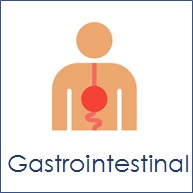
Side effects related to mouth, oesophagus, stomach, small intestine, large intestine, rectum, anus, liver, pancreas, and gallbladder.
nausea
vomiting
indigestion
haemorrhoids
oedema
decreased appetite
diarrhoea
oral pain
raised, tender, reddish nodules
ulcerative lesions
difficulty or painful swallowing
bowel & bladder changes
constipation
difficulty eating
mouth ulcers
reduction in salivary flow
dryness, redness, irritation to the mouth
changes in mouth and gums and throat and taste
candida
feel full quickly
delayed stomach emptying
bowel obstruction
bleeding gums
abdominal swelling
discomfort and increased waist size
abdominal pressure or pain
Indigestion
weight gain
bloating or gas
reflux or heartburn
The following health professionals can help with Gastrointestinal side effects. Follow the links below to learn more.
Acupuncture Therapist:
Acupuncture Therapists are people skilled in the practice of acupuncture, which is a family of procedures involving stimulation of anatomical locations on or in the skin by a variety of techniques.
Evidence:
Acupuncture creates a variety of health-improving effects, including alleviating pain, allowing for the reduction of pain medication and/or reduce its side effects, and improving the patient’s quality of life.
Cancer Exercise Therapist:
Cancer Exercise Therapist main role is to help people achieve optimal health by providing information and advice about exercise.
Evidence:
Breast cancer patients participating in an exercise intervention indicated that the chemotherapy-related muscle and joint pain was not aggravated by training.
Dietician:
Dieticians advise individuals on nutrition-related matters and can modify diets to treat or help manage chronic conditions, food allergies and food intolerances.
Evidence:
Dietitians can help offer strategies to manage various types of pain e.g. mouth, stomach, oesophagus such as avoiding certain foods or fluids, changing food texture and temperature.
Exercise Physiologist:
Exercise Physiologists are university qualified allied health professionals, who specialise in clinical exercise interventions for persons at high-risk of developing, or with existing chronic and complex medical conditions and injuries. These interventions are provided by exercise delivery including health and physical activity education, advice and support and lifestyle modification with a strong focus on achieving behavioural change.
Evidence:
Short-term physical activity programs reduce pain in cancer survivors.
Naturopath:
Naturopaths provide a complimentary medicine, by employing a wide array of “”natural”” treatments, including herbal medicine, diet and lifestyle counselling.
Evidence:
Chemotherapy induced peripheral neuropathy and neuropathic pain may be minimised by concurrent treatment with various nutritional supplements including vitamin E, vitamin B6, omega 3 fatty acids and acetyl-L-carnitine.
Nutritionist:
Nutritionists main role is to help people achieve optimal health by providing information and advice about health and food choices.
Evidence:
Honey significantly reduced the severity of mucositis associated pain and resulted in lesser treatment gaps and a decrease in overall radiotherapy treatment duration.
Oncology Massage Therapist:
Oncology Massage Therapists are nationally and internationally recognised.
Evidence:
It has been found that massage therapy significantly reduces the severity of the pain and improves the mood of patients with lung, breast, pancreas, prostate and colorectal cancers.
Social Worker:
The role of the oncology social worker is to help patients, families, and caregivers deal with the experience of facing cancer. Social workers are educated and skilled to assist with the psychological, social, emotional, and spiritual issues that people have to deal with in oncology.
Evidence:
All studies conducted to date found hypnosis effective in reducing the pain and anxiety of young patients during procedures.
Yoga Instructor:
Yoga Instructors teach a Hindu spiritual and ascetic discipline, a part of which, including breath control, simple meditation, and the adoption of specific bodily postures, is widely practised for health and relaxation.
Evidence:
According to a study published in the Journal of Neuroscience in April 2011, brain scans of this region demonstrated that mindfulness meditation can dramatically reduce sensitivity to pain-even more so than morphine.
